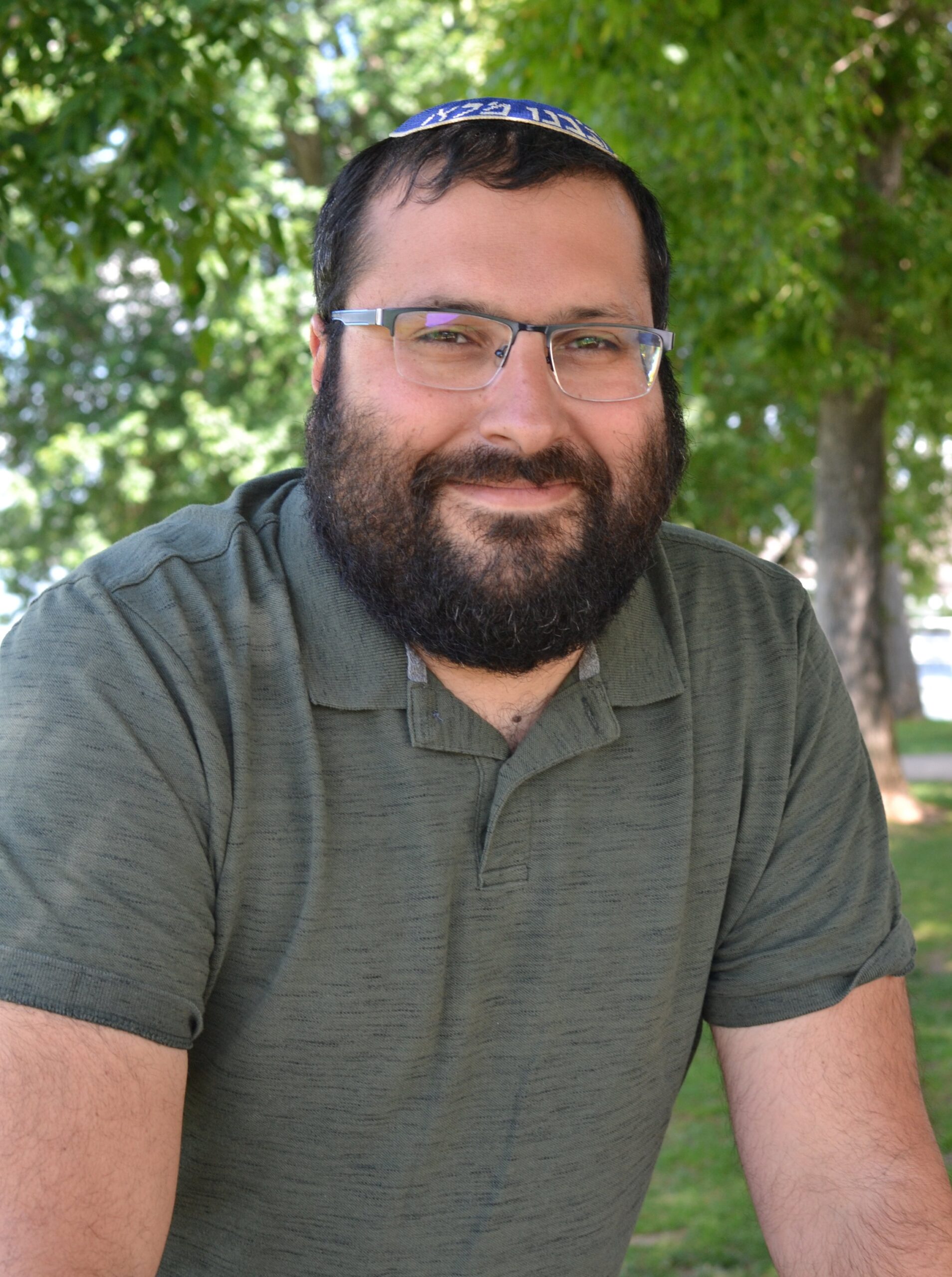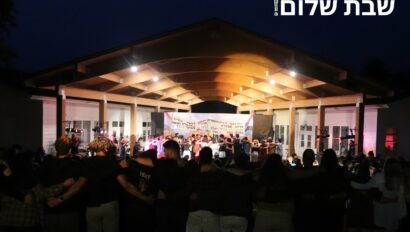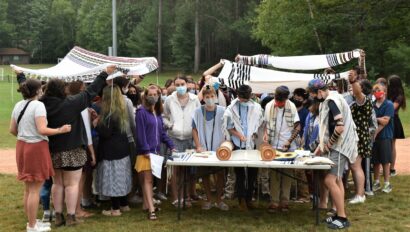The last weekend of camp is filled with rituals, none more momentous than those surrounding the final summer of the camper experience, Nivonim. One of these rituals is that of the Nivonim counselors choosing aidah members to offer reflections on their experience as campers. Beginning in the early 1990s, two campers from Nivonim have shared words of Torah at our final Friday night services to the entire camp community and, since the mid-2000s, additional platforms have been developed.
Below we share excerpts from some of these reflections, including the divrei Torah shared last Friday night by Dori Cohen and Aaron Cohen (no known relation), at Shabbat minchah (afternoon service) to Nivonim by Molly Mehr, and early Monday morning by Amitai Vales, just before Nivonim 2019 descended the Givah (hill) campus for the last time, singing as they walked through the gate at its foot, and made their way to the Ohel Yitzchak synagogue for a final tefillah (prayer) experience before boarding the buses.
Dori’s reflections focus on the journeys of the Israelites through the wilderness which are described in one of the Torah portions we read last week, parashat Massei. At the conclusion of parashat Massei we reach the end of the Book of Numbers, sefer Bemidbar, at which point congregations recite the phrase chazak chazak v’nitchazek, the meaning and import of which are the centerpiece of Aaron’s d’var Torah. At Shabbat minchah last week we began reading this week’s Torah portion, parashat Devarim, which serves as the textual inspiration of Molly’s words. Finally, Amitai meditates on lessons we can draw from the meaning of the names of the aidot our campers experience over the years.
It is a challenge for our campers to articulate exactly what happens to them and around them during their summers at camp. The intensity and power of the experience for so many of them is overwhelming and life-shaping. Dori, Aaron, Molly, and Amitai each capture a part of the Ramah experience in their words and, in the form of these divrei Torah, embody a central component of our mission: establishing and enhancing the contemporary relevance of our Jewish tradition in the lives of the next generation of engaged Jews.
Shabbat Shalom.
Dori Cohen
This week’s parashah, Matot-Massei, which brings us to the end of Bemidbar [Numbers], asks us to look back at the mutual connection of the Jewish people as they reflect on their journey through the desert. As they look forward to their eventual entrance into Eretz Yisrael [Land of Israel], B’nei Yisrael [Israelites] takes a moment to recall their long journey. In a way that is fitting for our last Shabbat as chanichim [campers], B’nei Yisrael ends one journey as they begin another. …
[The first verse of parashat Massei reads:]
אלה מסעי בני-ישראל אשר יצאו מארץ מצרים לצבאתם ביד-משה ואהרון:
Eleh massei b’nei yisrael asher yeitz’u me’eretz mitzrayim l’tzivotam, b’yad moshe ve’aharon
“These were the [journeys] of the Israelites who went out from the land of Egypt, troop by troop, in the charge of Moses and Aaron”
The Torah recalls all forty-two [stops on the] journeys of B’nei Yisrael. The Baal Shem Tov, an important chassidic thinker, interprets this pasuk [verse] from the beginning of Massei in the following way: “The forty-two ‘stations’ from Egypt to the Promised Land are replayed in the life of every individual Jew, as his soul journeys from its descent to earth at birth, to its return to its Source.” This interpretation focuses on the individual’s journey through shared experiences. Every member of B’nei Yisrael went on the same journey from place to place, but their experiences were all different based on their individual perspectives throughout their journey. …
Machaneh [Camp] Ramah is a makom [place] for chanichim [campers] to have shared experiences which bind us together. Within each aidah, everyone participates in the same pe’ulot [activities], but everyone’s view on the machaneh is slightly different. … Correspondingly, each member of B’nei Yisrael has time to reflect on their long journey through the desert, and this recollection serves as both a personal and communal reflection.
Aaron Cohen
This week parashiyot Matot-Massei bring us to the end of Sefer Bemidbar [Numbers] and into Devarim. Upon our completion of Bemidbar tomorrow morning, each makom tefillah [prayer space] around camp and בתי כנסת / batei k’nesset / synagogues around the world will engage in the formal tradition of chanting “Chazak Chazak, V’nitchazek!” to the reader at the end of the parashah. Invoking the idea of strength found in [the Book of] Joshua and elsewhere, the familiar phrase translates to “Strength, Strength, and may we be strengthened”. According to Professor Jeffrey H. Tigay, the reason for this phrase is three-fold:
We as a community call for strength to the Torah reader who has worked hard to learn and read the Torah accurately. We give strength to the person called for an Aliyah. When we recite hazak hazak v’veitikhazek, we are blessing the entire congregation to persist, study, and become empowered by the Torah.
The meaning in this thoroughly demonstrates the Jewish values of recognizing individual and communal strength; that an individual is not only as important as the community, but that one person’s power, persistence, and resilience in immersing themselves in Jewish learning is directly contributing to that of the entire community. At the same time, the individual’s strength relies on communal strength, and we have a communal obligation to support the individuals who spread Torah to the world.
…
“Chazak, chazak, Venitchazek”: As we conclude this summer, this phrase assumes a new meaning in our lives. Chazak: The first chazak is to all little moments, interactions, and opportunities that camp presents us with. If there is a random topic to be discussed, discuss it. If there is a joke to be shared or a late-night game of euchre to be played, do not be timid. These are the interactions that will tie you to the people with whom you’ve grown up. These moments will help shape the person you are destined to become. Chazak: The second chazak is to each and every individual that lives on this magical plot of land for two months out of the year. May your own unique traits, opinions, and personalities be a light to others and may this light strengthen the relationships you’ve built here. Venitchazek: May every aidah, anaf [program area], and kehillah [community] in and around camp be strengthened for years to come and may we do our part to strengthen them. May we see the brightness in each individual and may we recognize the force of strength that each brings respectively. Finally, may we continue to engage in the little moments, interactions, and opportunities that shape the Camp Ramah experience.
Molly Mehr
Our aidah loves singing the song Kol ha’olam kulo.
The words to the song are as follows: Kol ha’olam kulo, gesher tzar me’od. Veha’ikar lo lifached k’lal. “The whole world is a very narrow bridge and the main thing is to have no fear at all.” This concept of overcoming fear plays a role in the beginning of the book of Devarim [Deuteronomy], which is what we are reading at minchah [the afternoon service] today. In one of the final p’sukim [verses] we will read, God says,
וָאֹמַר אֲלֵכֶם בָּעֵת הַהִוא לֵאמֹר לֹא־אוּכַל לְבַדִּי שְׂאֵת אֶתְכֶם׃
Va’omar aleichem ba’eit hahee leimor: lo uchal l’vadee s’eit etchem
Thereupon I said to you, “I cannot bear the burden of you by myself.”
Here, God is frustrated with the Jewish people’s complaining and admits that He can’t handle them alone. … [I]f we skip ahead to what we will read next week, a more uplifting message is presented. Later in the parashah, the Israelites finally reach the [border of the] Land of Israel. They finished their long journey and were about to go into the Promised Land. But something felt wrong. They didn’t want to go in because they didn’t know what to expect. So they sent spies into the land to report back and then they would go in, assuming the reports would be positive. The spies came back with fruit from the land and told the Israelites that it was a good land. But despite this, they still didn’t want to go in. They even went on to say,
וַתֹּאמְרוּ בְּשִׂנְאַת יְהוָה אֹתָנוּ הוֹצִיאָנוּ מֵאֶרֶץ מִצְרָיִם לָתֵת אֹתָנוּ בְּיַד
הָאֱמֹרִי לְהַשְׁמִידֵנוּ׃
Vatom’ru: b’sinat adonai otanu hotzianu me’eretz mitzrayim lateit otanu b’yad ha’emori l’hashmideinu
“It is because the LORD hates us that He brought us out of the land of Egypt, to hand us over to the Amorites to wipe us out.”
It doesn’t seem right that the Israelites would be so reluctant to enter the land they have been anticipating for so long. But really, what’s holding them back is fear. No matter how many positive things they hear about the chapter of their lives they are about to enter, they will still be afraid. …
Now and over the next few days, we will go through the same process as we end our last summer as chanichim [campers] at Machaneh Ramah [Camp Ramah]. Whether it be through our madrichim [counselors] or past Nivonimers who came back for their reunion this summer, there have been many instances in which people who have already finished Nivonim have told us, “Life doesn’t end after Nivo.” We know there are great things to come for each and every one of us. But right here, right now, we don’t want to leave. We don’t want to go on without knowing when we will see our aidah-mates next. We don’t want to accept the fact that this is our final Shabbat as Nivonim 2019.
Our fear is valid. But we must remember, “Kol ha’olam kulo Gesher tzar me’od Veha’ikar lo lifached k’lal. The whole world is a very narrow bridge and the main thing is to have no fear at all.” By understanding the lyrics to one of our favorite songs, may we remember not to fear this impactful change in our lives. But may we also remember to apply what we have learned at camp into our lives at home. May we remember to go into every situation we encounter with the same amount of enthusiasm, holiness, and ruach as we are overwhelmed with when we sing Kol ha’olam kulo.
Amitai Vales
… [E]very aspect of life has happened here, together at camp. Every aspect of life. That is what camp has given us. More than that, camp has taken a human life span, encapsulated it into a bottle, and spilled it out for us here, in this place.
You begin life as an idea, non-physical, but a glimmer, a spark in someone’s eye. A hope for the future. Soon, you are planted on this earth. A living soul, given the chance to explore the world and all that it has to offer you. As you grow older, you set out and begin to carve new paths for yourself, as well as others. Your life takes turns in both good and bad ways, as you look up to the people who have helped you along, and aspire to follow in their footsteps. Aspire to be the person you set yourself to be. Taking the lessons of life experiences, you mature as a young adult, and enter a new stage in life. A stage where you can leave your legacy, impact the lives of people, and help those in need of assistance. That is exactly what you do. You understand the importance of giving light to the blind, and music to the deaf. At last, you stop, and notice the wisdom you have collected throughout your journey. The wisdom that has brought you closer to discovering who you are. The wisdom that has brought people you love and cherish into your life. You obtain this wisdom. But you can never forget where this was rooted from. Where it all began. And who helped you along the way.
I have just recited every stage in a person’s life. Everything from being yet an idea, to a wise, understanding, important human being. What I have also done, is recite each aidah here at camp.
Kochavim, stars.
Garinim, seeds.
Chalutzim, pioneers.
Solelim, trail blazers.
Shoafim, aspirers.
Bogrim, mature ones.
Machon, Institution.
Nivo, wise ones.
All of the steps we take in life reflect the eight aidot in camp. …
We take this mini-life of ours, and use it to the fullest of our abilities in the outside world. With all the sad, happy emotional, uplifting moments as campers, these moments push us further into life, and allow us to see what the future holds. And yet, none of this was done alone. Life is unique, and can only be fulfilled with friends and family holding onto a shovel, and helping you carve a wider path to your destination. A destination that is never reached.






